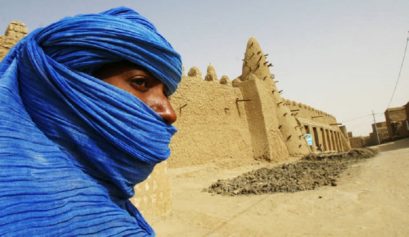Timbuktu is a city in the West African nation of Mali situated 20 kilometers (12 miles) north of the River Niger on the southern edge of the Sahara Desert. The rapid economic growth in the 13th and 14th centuries due to trade in salt, gold, ivory and other things, positioned the legendary city as one of the greatest academic and commercial centers in the world. The city’s golden age in the 15th and 16th centuries proved fertile ground for scholarship of religions, arts, math and sciences for its 100,000 inhabitants and the world.
Because of the difficulty of excavating through meters of sand that have buried the remains over the past centuries, there was no consensus on the origins of Timbuktu. However, a recent archaeological survey, between 2008 and 2010, by Yale academics confirmed that Timbuktu’s antiquity extends back further than its 12th century A.D. Tuareg origins, and permanent large-scale urban settlements began as early as 200 B.C. The researchers also concluded that Timbuktu was already part of trans-Saharan trade by 500 A.D.




